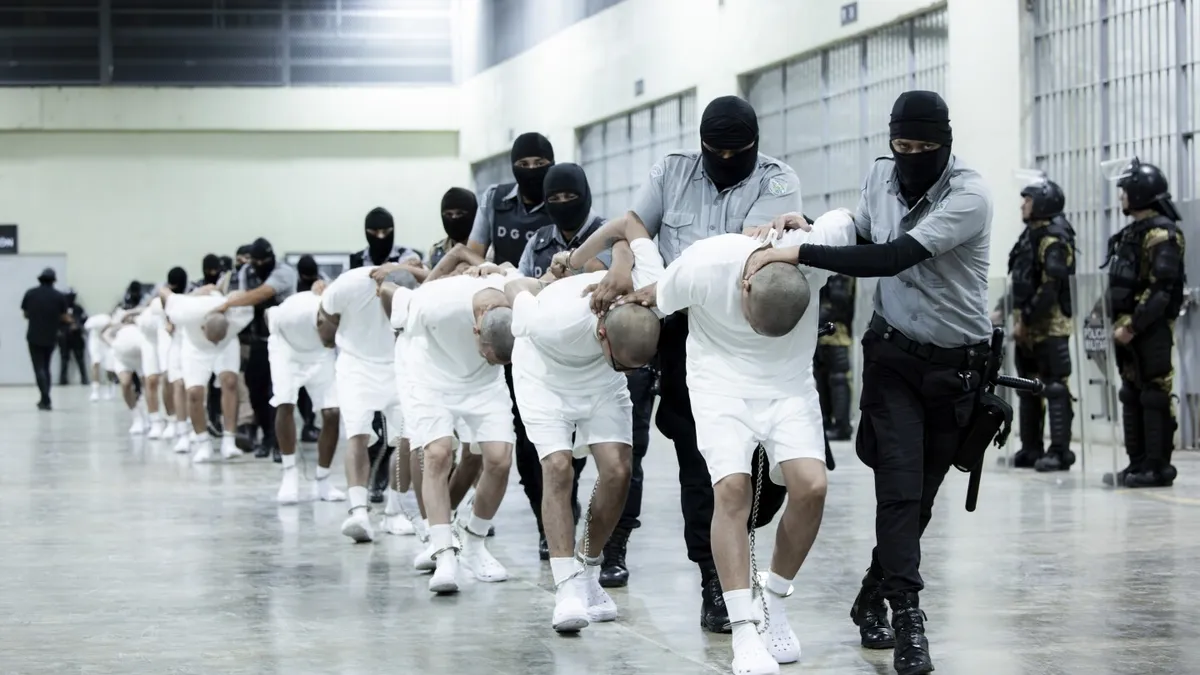
San Salvador, El Salvador (AP) — In a controversial move, the U.S. government recently utilized an 18th-century wartime law to deport over 200 Venezuelan immigrants to El Salvador. Upon arrival, these individuals were promptly transferred to the country’s maximum-security gang prison. A federal judge in Washington is currently assessing whether the U.S. government violated his order to return the migrants while they were en route. The judge has emphasized that these individuals should be allowed to contest their classification as alleged members of a notorious gang. However, there has been a notable silence from El Salvador’s president and judiciary regarding the legal status of these prisoners in the country.
In a significant development, lawyers representing the Venezuelan government initiated legal proceedings on behalf of the imprisoned Venezuelans, advocating for their release from the maximum-security facility. This legal action coincides with the scheduled visit of U.S. Homeland Security Secretary Kristi Noem to El Salvador on Wednesday. The U.S. claims that the Venezuelans deported on March 15 are affiliated with the Tren de Aragua gang, a criminal organization that former U.S. President Donald Trump labeled as an invading force. However, the U.S. has yet to provide any concrete evidence supporting these allegations.
The Alien Enemies Act facilitates the deportation of noncitizens without allowing them the chance to appear before an immigration court or federal judge. This situation is further complicated by the fact that El Salvador has not maintained diplomatic relations with Venezuela since 2019, leaving the deported Venezuelans without any consular assistance from their home country. Furthermore, even Salvadoran citizens have been enduring a state of emergency since 2022, which has led to the suspension of fundamental rights. This raises crucial questions about the legal future of the detained Venezuelans in El Salvador.
El Salvador’s President Nayib Bukele briefly acknowledged the situation the day following the deportation, stating that the U.S. had sent “238 members of the Venezuelan criminal organization Tren de Aragua” to his country. He further indicated that the U.S. would cover an annual fee for their incarceration. However, there has been an absence of comments from the El Salvador Attorney General’s Office and the Presidential Commissioner for Human Rights regarding the legal status of these Venezuelan prisoners.
According to David Morales, the legal director for the NGO Cristosal, there is no legal justification for the imprisonment of the Venezuelans in El Salvador. He stated that there are no Salvadoran laws or international treaties that would validate their detention. “These are illegal detentions because they haven’t been submitted to the jurisdiction of a Salvadoran judge, nor have they been prosecuted or convicted in El Salvador,” he explained, labeling their imprisonment as “arbitrary.” Morales also noted that the Salvadoran prosecutor’s office for human rights should intervene, but it is hindered by political influences.
On Monday, lawyers retained by the Venezuelan government filed a habeas corpus petition with the Supreme Court’s Constitutional Chamber, seeking the release of the 238 deported Venezuelans. Jaime Ortega, a lawyer representing 30 of the detained individuals, confirmed that the petition extends to all Venezuelans currently held in El Salvador. Prior to this legal action, constitutional lawyer Enrique Anaya had suggested that human rights organizations and families of the prisoners should file habeas corpus petitions to compel the government to justify the detentions. However, Anaya expressed skepticism regarding the potential for success due to the lack of judicial independence in El Salvador, which has seen the replacement of Supreme Court justices with judges more favorable to Bukele’s administration.
El Salvador has been under a state of emergency since March 2022, granting President Bukele extraordinary powers to combat the country’s entrenched street gang issues. This period has seen approximately 84,000 arrests based on alleged gang affiliations. The state of emergency has removed essential legal protections, including the right to consult with a lawyer or be informed of the reasons for arrest. Detainees can be held for 15 days without seeing a judge. While this crackdown has led to a dramatic reduction in homicide rates and boosted Bukele’s popularity, many detainees remain trapped in a legal limbo. A report from the Due Process Foundation indicated that the Supreme Court’s Constitutional Chamber has systematically rejected over 6,000 habeas corpus petitions filed by families of those arrested during the state of emergency.